- About Ramapo
- Academics
- Admissions & Aid
- Student Life
- Athletics
- Alumni
- Arts & Community
- Quick Links
- Apply
- Visit
- Give
Center for Data, Mathematical and Computational Sciences
January 23, 2026Hack Ramapo 2026: AI Integration Challenge
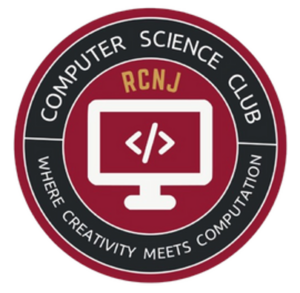
The RCNJ Computer Science Club and Sky Academy is excited to announce Hack Ramapo 2026 – an official Major League Hacking (MLH) event where innovation meets real-world impact.
Event Details
Date: Saturday, February 28, 2026
Time: 9:30 AM – 7:30 PM
Theme: AI Integration in Everyday Life
Prize Pool: $1,000
The Challenge
Build a project that uses AI to improve everyday life. More specific guidelines will be announced at kickoff—come ready to innovate!
Team Formation
Teams consist of three students. Don’t have a team yet? No problem! Register as an individual and join others to form a group during the opening session.
Open to All
Students from outside Ramapo College are welcome to participate. Spread the word to friends at other schools!
Perks
MLH will be on-site providing swag, merch, and T-shirts for participants throughout the day.
Register Now
Spots are limited—register as soon as possible to secure your place.
Register Here
Bring your ideas, skills, and team spirit to Hack Ramapo 2026!
Categories: Computer Science, Cybersecurity, Data Science, News + Updates
January 23, 2026Summer of AI 2026
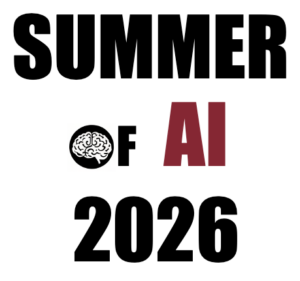
Online • Asynchronous • 12 Transferable Credits
Master artificial intelligence, machine learning, and agentic systems in one intensive summer. Three 4-credit courses designed to take you from foundations to building autonomous AI agents—all online and asynchronous.
Session 1 (May 27 – June 30):
- Machine Learning
Session 2 (July 9 – August 11):
- Artificial Intelligence
- Agent Engineering
Take one, two, or all three courses!
CMPS 320: Machine Learning
Session 1 (May 27 – June 30) • 4 Credits
Build the mathematical and algorithmic foundation for modern AI. Implement regression, classification, and neural networks from scratch. Master the complete ML pipeline from data preprocessing to model evaluation and deployment.
Topics include: Linear & Logistic Regression, Decision Trees & Ensembles, Neural Networks & Backpropagation, Support Vector Machines, K-Means Clustering, Dimensionality Reduction (PCA), XGBoost & LightGBM, Deep Learning Foundations, Model Evaluation & Cross-Validation
CMPS 331: Artificial Intelligence
Session 2 (July 9 – August 11) • 4 Credits
Explore the core reasoning and representation techniques of AI. From search algorithms and game-playing to probabilistic reasoning and expert systems. Build intelligent systems that reason, plan, and make decisions under uncertainty.
Topics include: Search Algorithms (BFS, DFS, A*), Adversarial Search & Minimax, Alpha-Beta Pruning, Propositional & Predicate Logic, Bayesian Networks, Fuzzy Logic, Expert Systems, Planning & STRIPS, Knowledge Representation
CMPS 367: Agentic Software Architecture
Session 2 (July 9 – August 11) • 4 Credits
The cutting edge of AI engineering. Build autonomous AI agents that perceive, reason, and act. Master LLM integration, tool use, RAG systems, memory architectures, and multi-agent coordination. You’ll build a production-ready coding agent from scratch—then extend it with retrieval, memory, and skills systems.
Topics include: Transformer Architecture & LLMs, Agent Loop Design, Tool Use & Function Calling, Prompt Engineering & Context Engineering, Retrieval-Augmented Generation (RAG), Memory Systems (Conversation, Episodic, Semantic), Multi-Agent Patterns, Model Context Protocol (MCP), LangChain & Framework Evaluation, Guardrails & AI Safety
Prerequisites
Ramapo Students: You should have completed CMPS 231 (Data Structures) or CMPS 240 (Programming II). These courses are designed for Computer Science, Data Science, and Cybersecurity majors.
Students from Other Institutions: If you have coursework in programming (Python, Java, C++, or similar), you’re likely prepared. Earn 12 transferable credits applicable to your CS or related major. Contact us with questions about your preparation.
Technical Requirements: Basic programming proficiency is required. Familiarity with Python is helpful but not required—you’ll gain extensive Python experience throughout the sequence. All courses are fully online and asynchronous.
Questions?
Wondering if this sequence is right for you? Curious about transferring credits or your preparation level? Reach out—we’re happy to help.
Scott Frees, Ph.D.
Convenor, Computer Science & Cybersecurity
Ramapo College of New Jersey
sfrees@ramapo.edu
Categories: Computer Science, Cybersecurity, Data Science, Mathematics, News + Updates
December 1, 2025Ramapo DMC 12/1 - Updates and important events
Dear DMC Students –
As we wind down on the Fall semester, please keep the following in mind:
Spring 2026 Registration
If you have not registered for your Spring 2026 classes yet please do so immediately. The College modifies course offerings based on enrollment – over enrolled and under enrolled courses necessitate changes, and delaying your registration reduces our ability to make those adjustments for you.
If you are eligible for CMPS 366 (Organization of Programming Languages), please register for Spring 2026. There is no guarantee an alternative will be available in Fall 2026, so do not delay taking this course.
Winter 2026 Registration
Two courses being offered relevant to your majors this Winter – CMPS 130 and CMPS 147. CMPS 130 is a required course in Data Science, CMPS 147 is a required course in Computer Science and Cybersecurity. If you have questions about the Winter session, please email me.
Graduate Students – Thesis Proposal Course
If you are an MS student and plan to do your Thesis in either Summer 2026 or Fall 2026, please register for your 1-credit Thesis Proposal in Spring 2026. This is a required course that you must complete prior to your thesis semester. It is currently open for registration. Please contact me if you have any trouble signing up.
4+1 MSDS / MSCS / MSAM (Seniors)
Registration for graduate courses as an undergraduate requires an override (even if you are in the 4+1). Email me to get the override for registration!Read more
Looking for a job? ITS is looking for a programmer
Categories: Computer Science, Cybersecurity, Data Science, Mathematics, MSCS, MSDS, News + Updates
November 18, 2025DMC Partners with South Brunswick High School on AI in Computer Science Education
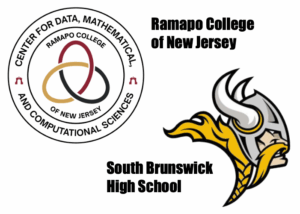
The DMC Center is collaborating with South Brunswick High School on a research project exploring how generative AI tools can support – rather than replace – student learning in introductory computer science courses.
As AI tools like ChatGPT become increasingly common in education, there’s an open question: how do we help students use these tools effectively without short-circuiting the learning process? This partnership between DMC Director Scott Frees and SBHS Computer Science teacher (and Ramapo adjunct Computer Science professor) Steven Schiff aims to find out.
The study involves high school students across eight sections of “Computer Science in the 21st Century,” testing three different approaches to AI access: no AI, limited AI (where students use it only for understanding), and a custom-build AI assistant – built at the Ramapo DMC Center – designed to explain concepts without writing code for students. By rotating these conditions across different programming topics, the research team hopes to understand which approaches help students learn foundational concepts most effectively.
This collaboration represents the kind of practical research needed as educators adapt to rapidly evolving technology. Rather than banning AI or giving students unlimited access, the project explores middle ground—helping students develop both programming skills and the judgment to use AI tools responsibly. The findings will provide guidance for computer science educators navigating similar questions about AI integration in their own classrooms.
Learn more about the project at codewithgrace.com.
Categories: Computer Science, Cybersecurity, Data Science
September 9, 2025Highlight Your Internship Story: Emily Morra - New Jersey Jackals
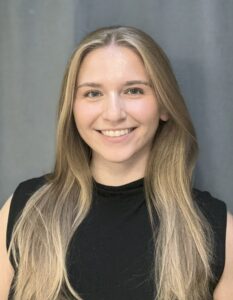
Welcome to the DMC’s Highlight Your Internship Story series, where we showcase the impressive work our students are doing during their internships. These stories highlight how hands-on experience is helping them grow professionally and launch successful careers in tech.
Congratulations to Emily Morra, Data Science major at Ramapo! This summer, Emily worked with the New Jersey Jackals, a semi-professional baseball team, as an Analytics Intern. She manned the TrackMan Baseball system, which uses AI cameras around the stadium to track pitches and generate information on a wide variety of useful statistics, such as spin rate, exit velocity, launch angle, and more. The analytics team uses this data to create scouting reports for coaching staff and players ahead of each series or trade transaction. Being able to translate the raw data into understandable reports was a skill that could be translated into any concentration of data science, and the fast-paced environment tested her quick learning and thinking skills. Emily has a Sports Management minor and is looking to pursue a career in Sports Analytics, and this experience served as a meaningful step towards her future.
If you are in any of the DMC majors – Computer Science, Data Science, Cybersecurity, Mathematics, and Bioinformatics – and would like to be featured, please contact Dr. Al-Juboori (aaljuboo@ramapo.edu) or Dr. Frees (sfrees@ramapo.edu)!
Categories: Data Science, Internship Story
August 29, 2025Learn how Ramapo's MSDS aligns with the nationally recognized ADSA core Data Science competencies
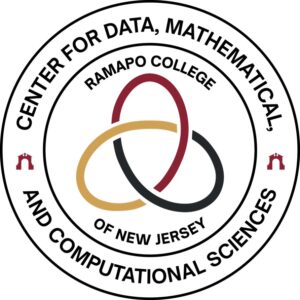
The Academic Data Science Alliance (ADSA) Data Science Taxonomy represents a comprehensive framework of competencies for Master’s-level data science programs, developed through collaboration with leading academic institutions and federal partners including NSA, DOD, NIH, and NSF.
This nationally recognized taxonomy establishes standardized competencies that ensure graduates possess the critical skills needed in today’s data-driven economy, making it highly valued by employers across industries.
Ramapo College’s Master of Science in Data Science program aligns exceptionally well with this prestigious framework, demonstrating our commitment to providing students with industry-relevant, federally-recognized competencies that will distinguish them in the competitive data science job market. It’s one of the reasons Ramapo’s MSDS has been consistently listed as one of Fortune’s Best Masters degrees in Data Science.
Our Master of Science (MS) in Data Science degree is a 30-credit program with course work in Python, R, Data Visualization, Database Systems, Machine Learning, Statistics and Mathematical Modeling. Full-time students will complete their degree in 18 months. Courses are delivered as a combination of online, hybrid, and evening in-seat format – you can complete the degree while being on campus just one night a week.
Explore the detailed mappings below to see how each course in our program contributes to building these essential, nationally-recognized data science skills.
| Foundations of Analytics: Statistics | |
|---|---|
Data Collection DesignMethodical approach to gather observations, measurements and information from different sources |
|
InferenceProcess of using statistics to make conclusions about a population based on a random sample |
|
Modeling (Stochastic)Method of generating sample data and making real-world predictions using statistical models |
|
Multivariate AnalysisStatistical techniques that simultaneously look at three or more variables |
|
Statistical LearningProcess of learning from data using statistical algorithms |
|
Bayesian MethodsTheory based on Bayesian interpretation of probability |
|
Causal inferenceProcess of determining independent effect of a phenomenon |
|
Model uncertaintyLevel of understanding of world representation for mathematical modeling |
|
Experimental designCarrying out research in objective and controlled fashion |
|
SamplingSelection of subset from statistical population to estimate characteristics |
|
| Foundations of Analytics: Mathematics | |
Set theory and basic logicFundamental mathematical concepts dealing with collections of objects and logical reasoning |
|
Matrices and basic linear algebraMathematical structures and operations for solving systems of linear equations |
|
Optimization – algorithmMathematical techniques for finding the best solution from all feasible solutions |
|
Probability theoryMathematical framework for analyzing random phenomena and uncertainty |
|
Arithmetic and GeometryBasic mathematical operations and study of shapes, sizes, and properties of space |
|
Graph Theory and NetworksStudy of graphs as mathematical structures used to model pairwise relations |
|
| Foundations of Analytics: Data Analytics | |
Exploratory AnalysisApproach to analyzing data sets to summarize their main characteristics |
|
Variable DistributionsDescription of how values of a variable are spread or distributed |
|
Scatter PlotsGraph using Cartesian coordinates to display values for two variables |
|
Correlation AnalysisStatistical method used to evaluate the strength of relationship between variables |
|
Conditional ProbabilityProbability of an event occurring given that another event has occurred |
|
Spatial AnalysisExamining locations, attributes, and relationships of features in spatial data |
|
Data VisualizationRepresentation of data through graphics like charts, plots, infographics |
|
Artificial IntelligenceTechnologies that enable computers to perform advanced functions including analysis |
|
Classical AITraditional artificial intelligence approaches using symbolic reasoning |
|
Modern AI/Data Driven AIContemporary AI approaches based on machine learning and data analysis |
|
Machine LearningSubfield of AI using data and algorithms to learn and improve accuracy over time |
|
Classical MLTraditional machine learning algorithms and statistical methods |
|
Deep LearningMachine learning based on artificial neural networks with multiple processing layers |
|
NLPBranch of AI allowing computers to interpret human language similarly to humans |
|
Uncertainty Quantification/CharacterizationAssessment and representation of uncertainties in computational models |
|
Data MiningPractice of analyzing large databases to generate new information |
|
| Foundations of Analytics: Data Modeling | |
Model Development and DeploymentProcess of creating, testing, and implementing predictive models |
|
Model Risks and Mitigation StrategiesIdentification and management of potential model failures |
|
Model analysis and ValidationEvaluation of model performance and reliability |
|
Data VisualizationRepresentation of data through graphics like charts, plots, infographics |
|
| Systems and Implementation: Computing and Computer Fundamentals | |
Data StructuresWays of organizing and storing data in computer programs |
|
AlgorithmsStep-by-step procedures for solving computational problems |
|
SimulationsImitation of real-world processes or systems using computational models |
|
Data EngineeringPractice of designing and building systems for collecting and analyzing data |
|
Database DesignProcess of producing detailed data models and database structures |
|
Data Preparation and CleaningProcess of detecting and correcting corrupt or inaccurate records |
|
Records Retention and CurationManagement and preservation of data records over time |
|
Big Data SystemsTechnologies for processing data sets too large for traditional software |
|
Data Security and PrivacyProtection of data from unauthorized access and ensuring privacy |
|
Cloud ComputingDelivery of computing services over the internet |
|
High Performance ComputingUse of parallel processing for running advanced computation programs |
|
| Systems and Implementation: Software Development and Maintenance | |
ProgrammingProcess of creating computer programs using programming languages |
|
Collaboration and version controlTools and practices for team software development |
|
Database/data warehousingSystems for storing and managing large amounts of structured data |
|
| Data Science Project Design: Users and Impacted Groups | |
Implications of analysis and resultsUnderstanding the broader impact and consequences of data analysis |
|
Defining the user and UX designCreating user-centered design for data products and interfaces |
|
Story-telling with dataCommunicating insights and findings through compelling data narratives |
|
Human-centered designDesign approach that focuses on human needs and experiences |
|
| Data Science Project Design: Research Methods | |
Hypothesis developmentFormulating testable predictions based on observations |
|
Defining data-driven questionsCrafting questions that can be answered through data analysis |
|
Computational logicApplication of logical reasoning in computational problem-solving |
|
Data-driven decision makingMaking decisions based on data analysis rather than intuition |
|
Data/research lifecycleComplete process from data collection to research conclusions |
|
Analysis and presentation of decisionsCommunicating analytical findings to support decision-making |
|
| Data Science Project Design: Data | |
Data acquisitionProcess of gathering data from various sources |
|
Data governanceManagement of data availability, usability, integrity and security |
|
Data provenance and citationDocumentation of data sources and proper attribution |
|
| Data Science Project Design: Open Science by Design | |
Reproducibility, replicability, repeatabilityEnsuring research can be verified and repeated |
|
Interactive computingComputing environment that allows real-time user interaction |
|
| Data Science Project Design: Visualization | |
Grammar of graphicsSystem for describing and building statistical graphics |
|
Static and dynamic visualization designCreating both fixed and interactive data visualizations |
|
| Data Science In Practice: Responsible Practices | |
Relevant domain knowledge for effective decision-makingUnderstanding the specific field or industry context |
|
Legal considerationsUnderstanding legal requirements and constraints in data use |
|
Data privacyProtection of personal and sensitive information in datasets |
|
Data and product/system security and resilienceEnsuring robust protection against threats |
|
Data and product/system governanceOversight and management of data systems |
|
Research integrityAdherence to ethical principles in research conduct |
|
Assessment, monitoring, and management of risksSystematic approach to identifying and controlling risks |
|
Understanding and uncovering biasIdentifying and addressing systematic errors in data and analysis |
|
Interpretability and ExplainabilityMaking complex models understandable to humans |
|
Human impacts of designConsidering how design decisions affect people and communities |
|
Responsible data collectionEthical approaches to gathering data from individuals and communities |
|
Understanding impacted communitiesRecognizing how data work affects different groups of people |
|
| Data Science In Practice: Effective Collaboration | |
Working with stakeholdersCollaborating effectively with various project participants |
|
Working with domain expertsPartnering with subject matter experts |
|
Project managementPlanning, executing, and controlling project activities |
|
Infrastructure cost and benefitsEvaluating financial and operational aspects of technology infrastructure |
|
Participatory research / stakeholder engagementIncluding community members in research processes |
|
| Data Science In Practice: Communication | |
Technical writing skillsCommunicating complex technical information clearly |
|
Communication (oral) and presentation skillsEffectively presenting information to audiences |
|
DocumentationCreating clear and comprehensive project documentation |
|
Categories: Data Science, MSDS
August 15, 2025DMC Lecture Series: The Future Is Not Fixed: How AI & Non‑Deterministic Systems Are Reshaping Work

The first event for this year’s DMC Lecture series features a Ramapo Computer Science alum – Save the date!
Tuesday September 9th, 2025
ASB 429 @ 5:30pm
Artificial intelligence is changing how we work, moving us from predictable processes to systems that operate on probabilities and uncertainty. This talk explores what this shift means for students entering the workforce. Devinder will examine how humans and AI collaborate in practice, what skills are becoming essential, and how to make responsible decisions when working with uncertain technologies. Students will learn practical strategies for thriving in careers where adaptability and critical evaluation of AI outputs are key professional skills.
Speaker Bio
Devinder Sodhi is a Ramapo College Computer Science graduate (2016), who currently shapes AI curriculum development at DataCamp and leads technology communities at Frontier Tower and AICamp SF. His engineering background spans diverse industries, including jet engine testing systems at Qt, surgical robotics at Johnson & Johnson, and medical imaging platforms at Canfield Scientific. Sodhi focuses on practical AI implementation and education, teaching professionals how to effectively integrate AI tools into their workflows while maintaining critical oversight of probabilistic outputs.
Categories: Data Science, Lecture Series, MSCS, MSDS
January 28, 2025DMC Fair keynote speaker: Michael Geraghty
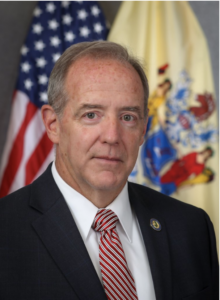
Director of the NJ Cybersecurity and Communications Integration Cell (NJCCIC) and Chief Information Security Officer for the State of New Jersey
DMC Fair Save-The-Date!
Date/Time: Wednesday, 4/23/25, 5-7 pm
Location: Ramapo College, Trustees Pavilion
Join us for the Center for Data, Mathematical, and Computational Sciences (DMC) Fair on April 23th, 2025.
Following the keynote speech, attendees can view posters showcasing Ramapo students’ research projects in Data, Mathematical, and Computational Sciences. Attendees will be able to network with Ramapo students and faculty as well as industry professionals. Awards will be given for the best posters and refreshments will be served.
From Bytes to Insights: Practical Data Science Applications in Cybersecurity
In this presentation, Michael Geraghty, Chief Information Security Officer (CISO) for the State of New Jersey will bridge the gap between academic data science concepts and their real-world applications in the field of cybersecurity. Drawing from extensive industry experience, Mr. Geraghty will demonstrate how data science techniques are applied in threat detection, risk assessment, and incident response in enterprise environments. Through case studies and practical examples, attendees will gain insights into the challenges and opportunities of applying data science in a cybersecurity context. By the end of the session, attendees will have a clearer understanding of how their data science skills can be applied to solve real-world cybersecurity problems, as well as the career paths available in this rapidly evolving field. The talk will conclude with a Q&A session.
Michael Geraghty is the State of New Jersey’s Chief Information Security Officer (CISO) and Director of the New Jersey Cybersecurity and Communications Integration Cell (NJCCIC). In these roles Director Geraghty is responsible for the development and execution of the State’s cybersecurity strategy. He is responsible for leading and coordinating New Jersey’s cybersecurity efforts while building resiliency throughout the State and has direct responsibility for all aspects of statewide cybersecurity operations; governance, risk and compliance; and incident response.
Mr. Geraghty is an accomplished cybersecurity executive with a history of building innovative and model programs in private and public sector enterprises including roles as CISO of the Hudson’s Bay Company, Chief Information Officer of the National and International Centers for Missing and Exploited Children, Vice President of High Technology Investigations at Prudential Financial, and Network Intrusion Detection Manager, Lucent Technologies/Bell Labs. Mr. Geraghty began his career with the New Jersey State Police, where he served 12 years and led the formation and development of its High Technology Crimes Investigations Unit.
He has provided expert testimony before the United States Congress and in federal, state, and international courts on computer crime investigations and forensics. Geraghty is a past president of the Northeast Chapter of the High Technology Crimes Investigation Association and has held leadership roles in the National Strategic Policy Council on Cyber and Electronic Crime.
Categories: Data Science, Lecture Series, Mathematics, MSCS, MSDS
October 22, 2024Larry Shapiro - AI implementation for Finance Operations

AI implementation in Finance operations
Speaker: Larry Shapiro from PwC
When: Monday 11/11 at 6:30pm – Room ASB 136
Topic: AI implementation in Finance operations: Larry Shapiro leads the Global Oracle ERP implementation at PwC including application of AI to finance operations and engagement management. Larry’s talk will resemble a real life case study on how leaders in large global enterprises embrace AI.
Some of the topics he will cover include:
Leadership Concerns:
- Risk Management: AI-related risks (e.g., model drift, bias, security breaches).
- Regulatory Compliance: Adhering to regulations (e.g., GDPR, CCPA, FINRA).
- Return on Investment (ROI): Measuring AI’s financial benefits.
Ethical Considerations:
- Bias and Fairness: Ensuring AI systems don’t perpetuate existing biases.
- Transparency and Explainability: Understanding AI-driven decisions.
- Data Privacy: Protecting sensitive financial information.
Strategic Imperatives:
- Digital Transformation: AI’s role in modernizing finance operations.
- Competitive Advantage: Leveraging AI for financial insights and agility.
- Talent and Skills: Upskilling/reskilling workforce for AI-driven finance.
Implementation Challenges:
- Change Management: Overcoming organizational resistance.
- Data Quality and Integration: Ensuring accurate and unified data.
- Scalability and Security: Deploying AI solutions enterprise-wide.
Please contact Jane Riff ( jriff@ramapo.edu ) for more information.
Categories: Data Science, Lecture Series, Mathematics, MSCS, MSDS
February 20, 2024A personal view of the Design and Evolution of C++ - Bjarne Stroustrup

Bjarne Stroustrup, inventor of the C++ language and a pioneer in the field of Computer Science, is coming to Ramapo College on March 13th at 3:30 pm. Join us to learn about the past, present, and future of the language, and Dr. Stroustrup’s personal insights on its impact on the field of Computer Science . Dr. Stroustrup is currently a Professor of Computer Science at Columbia University in New York, NY.
All are welcome! Food will be available, along with a raffle for Google earbuds – courtesy of the Computer Science Club and co-sponsors. Check back here for room information as we get closer to the event.
Categories: Data Science, Lecture Series, MSCS, MSDS
October 26, 2023Science in Business: Challenges and Opportunities
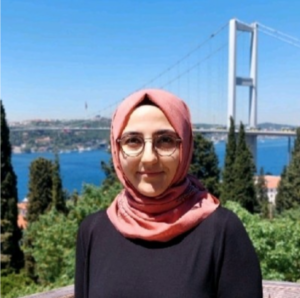
Thursday, November 9, 2023, 11:15am – 12pm – Virtual (WebEx)
Please join us for a talk by Dr. Seyma Guven, Senior Applied Scientist at Amazon!
Dr Guven will share her personal journey to realizing how science works in a business setting. The talk will cover perspectives on the challenges and how students can be
better prepared to meet those challenges. This will be an open ended discussion – so bring your questions!
Dr. Guven have a Ph.D. in Operations Research from Georgia Tech, specializing in optimization in supply chain & logistics applications. She has been working for Amazon for 4+ years, in Supply Chain and Optimization Technologies (SCOT) department. She develops mathematical models and methodologies to solve inventory and transportation problems with high uncertainty using operations research and statistics techniques.
WebEx link provided to registrants prior to event
Categories: Data Science, Lecture Series, Uncategorized
March 29, 2023Bytes & Bites: Dinner and Data with Industry Professionals

Thursday, April 20, 3:30 PM – 6:30 PM (Alumni Lounges)
Please join us for sessions with Jane Riff, Product Manager, Business Intelligence & Advanced Analytics at KPMG and Peter Podolski, Senior Data Scientist at UPS
These sessions will focus on discussing the Capabilities of a Data Science Center of Excellence and on Theory, Practice and Pragmatism in Enterprise Data and Computer Science. This is a 3 part event, with a dinner for attendees served in between the 2 lectures for an opportunity for students to mingle with presenters and to informally discuss topics relating to the presentations.
Event Schedule:
-
- 3:30 PM – 4:30 PM: Presentation on Capabilities of a Data Science Center of Excellence by Jane Riff, KPMG
- 4:30 PM – 5:30 PM: Dinner and mingle with DMC students
- 5:30 – 6:30 PM: Presentation on Theory, Practice, and Pragmatism in Enterprise Data and Computer Science by Peter Podolski, UPS
Categories: Data Science, Lecture Series
March 29, 2023Data in the Music Industry
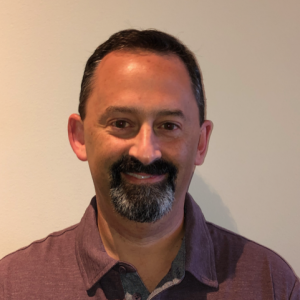
Tuesday, April 4, 5:00 PM – 6:30 PM – SC-158 (Alumni Lounges)
Please join us for a talk by MSDS Alum Keith Osani, VP of Global Technology Data & Analytics at Sony Music!
This session will discuss the type of data available to music companies from digital platforms such as Spotify, Apple Music, Amazon, YouTube, TikTok and more. We will also explore the increasing volumes of data and the data engineering required to handle it all. Insight will also be given into the tools that data analysts are using to access the data and what types of analysis they are performing.
Categories: Data Science, Lecture Series, MSDS
March 15, 2023Decoding Data Science: A secret recipe for success
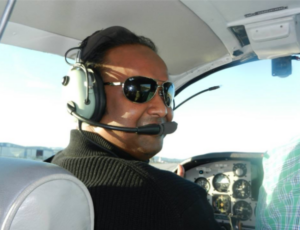
Thursday, March 30, 2023 7-8pm – ASB 323
Please join us for a DMC Lecture Series event: Decoding Data Science: A secret recipe for success, given by Dr. Kanad Basu, Data Science Leader & Applied Mathematician!
Abstract of talk:
Data Science has completely transformed all major business sectors such as IT, Banking, Healthcare, Entertainment, Sports & much more. In order to make better & smarter decisions, businesses all over the world have long gathered & analyzed data. The global data science platform market was worth US $ 3.93 billion in 2019 and US $ 4.89 billion in 2020. From 2020 to 2027, it is predicted that the Data Science market will increase at a compound annual rate of 26.9 percent. There has never been a better time to study analytics & data science and contribute to this exciting field.
In this talk Kanad will share his transition journey, lessons picked up along the way, the skills one must develop for being a successful data scientist and how to prepare & market yourself for the job market.
About the author:
Kanad Basu, an interdisciplinary scientist who has 18+ years of analytics and data science experience spanning across academia and industry. Kanad holds the prestigious “Professor of Practice” position at Thunderbird School of Global Management, Arizona State University. He also led a market research data science team at Medallia that focuses on building a consumer behavioral intelligence and benchmarking platform that combines millions of consumer activities to allow businesses to understand where, how, and why consumers spend their time and money. Before Medallia, he led the computer vision data science team at Covisus where he and his team implemented state of the art computer vision algorithms to keep our nation safe by securing supply chains, protecting global compliance for pharmaceutical and medical industries and aiding brands in the prevention of product tampering.
Kanad holds a PhD in Applied & Computational Mathematics, has multiple publications, patents & book chapters around big data analytics and statistical applications in the field of Mathematical Biology & Mathematical Finance. Kanad is a frequent speaker at national & international conferences in AI & Data Science.
Categories: Data Science, Lecture Series, MSCS, MSDS
February 14, 2023Maximum Likelihood Estimation for Discretely Observed Multivariate Vasicek Processes

Tuesday, February 21, 2023 – Via WebEx
Please join us for a DMC Lecture Series event: Maximum Likelihood Estimation for Discretely Observed Multivariate Vasicek Processes, given by Dr. Michael Pokojovy, Assistant Professor, Department of Mathematical Sciences, PhD Program in Data Science, PhD Program in Computational Science, The University of Texas at El Paso (UTEP)!
This talk will discuss analyzing multiple zero-coupon bonds simultaneously to forecast future short rate dynamics. Those forecasts can play important roles in risk management, portfolio optimization, and other applications.
Because of low correlation with other asset classes, bonds play major roles in portfolio diversification efforts. A pure discount or a zero-coupon bond is a contract that does not involve intermediate interest payments but is traded at a deep discount, rendering yields at maturity when redeemed at full face value. As investment funds can create robust diversified portfolios with bonds, it is imperative that multiple bonds be analyzed simultaneously. The classical Vasicek model studies individual zero-coupon bonds and assumes the instantaneous interest rate follows a mean reverting process. In this talk, we consider an extension of the original Vasicek model to multiple zero-coupon bonds. The resulting coupled model is given by a stochastic differential equation driven by a p-dimensional white noise process. Given a set of observations over an equispaced time grid, our goal is to calibrate the system and forecast future short rate dynamics. Those forecasts can play important roles in risk management, portfolio optimization, and other applications. This is joint work with Ebenezer Nkum and Thomas M. Fullerton (UTEP).
Michael Pokojovy is an Assistant Professor of Data Science and Statistics. He holds a Ph.D. and a Dipl.-Math. degree in Mathematical Sciences, both from the University of Konstanz, Germany. Prior to his current appointment at UTEP, Dr. Pokojovy has held several postdoctoral positions in Europe and the US. His research interests include Statistical & Machine Learning, Big Data Analytics, Scientific Computing, etc. In addition to numerous theoretical and methodological developments, he has a track record of collaborative research in statistical process control, quantitative finance, engineering, biomedical sciences, rational mechanics, etc. He has authored and co-authored a number of publications in a variety of professional journals. Dr. Pokojovy has also mentored and advised numerous undergraduate, graduate and doctoral students as well as postdoctoral scholars who are now successfully pursuing various exciting careers in industry or academia.
This talk was supported by a grant from the Ramapo College Foundation.
WebEx information will be provided upon registration
Categories: Data Science, Lecture Series, MSCS, MSDS
January 3, 2023Data Storytelling: The Secret to Delivering Business Impact with Analytics

Thursday, January 26, 2023 – 7-8pm – Location ASB 323
Please join us for a DMC Lecture Series event on Data Storytelling: The Secret to Delivering Business Impact with Analytics, given by Ganes Kesari, the Co-founder and Chief Decision Scientist at Gramener!
Did you know that over 50% of analytics projects fail due to bad data storytelling? Organizations invest heavily in hiring data science experts, buying expensive licenses, and setting up analytics processes. However, without the right data visualization, all this effort will go to waste. Stories have the power to engage people and inspire them to action. This session will introduce you to the concept of data storytelling. It will reveal the 4 steps to mastering visual storytelling with data using exciting industry examples.
Takeaways:
- Understand the top challenges in converting data into actionable business decisions
- Learn the 4-steps to building powerful data stories using real-world case studies
- Find out how data visualization can drive decision-making at organizations
Ganes Kesari is the Co-founder and Chief Decision Scientist at Gramener , a data science company that helps organizations present data insights as stories. He advises executives on data-driven leadership and helps organizations adopt a data culture. Ganes is a TEDx speaker and Forbes Contributor. Find his latest work here: gkesari.com.
This talk was supported by a grant from the Ramapo College Foundation.
Categories: Data Science, Lecture Series, MSCS, MSDS
November 6, 20222022 Information Technology, Data Science & Computer Science Career Fair
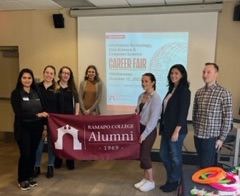
Wednesday October 12, 1-3 pm, Alumni Lounges
On October 12, the Cahill Career Center hosted a specialized fair for Computer Science, Mathematics, Data Science and Information Technology majors to connect them to leading employers within their fields. 13 employers from a wide range of industries attended this event, with nearly 100 DMC students in attendance. Employer feedback was very positive, with high praise for RCNJ students on their preparedness and levels of knowledge. 100% of employers indicated that they would come back and attend more RCNJ events, with a highlight being the amount of engagement they each received from students in attendance. On the student end, surveys indicated more positive outcomes, with a focus on networking and the wide range of job opportunities that were discussed at the fair by employers.
The following employers were represented at this event: ACord Insurance, Aspen Insurance, Brooksource, Crestron Electronics, Gain Theory, Reckitt, SciTec, In., Selective Insurance Company of America, Sharp Electronics, United States Secret Service, UPS as well as the DMC Center and RCNJ Graduate Admissions. Of note, 7 RCNJ alumni represented their respective Employers at this Fair!
Categories: Data Science, MSCS, MSDS
October 25, 20222022 Raciti Memorial Lecture - The Curious Economics of Big-time College Sports
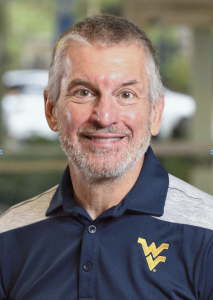
Thursday October 27, 6 pm, ASB 136
Please join us for a DMC Lecture Series event on economics, data, and sports – given by Dr. Brad Humphreys, West Virginia University and the Eastern Economic Association!
Dr. Humphreys is one of the leading sports economists in the world today, mainly known for his contributions to the economics of sports stadiums and the economics of college athletics. He is the 2016-17 Benedum Distinguished Scholar in Social and Behavioral Sciences at WVU and is the recipient of the 2022 Peter Sloane Award for his research contributions to European sports economics. He served as the President of the Eastern Economic Association in 2021-2022.
He is Editor-in-Chief of Contemporary Economic Policy, a general interest economics journal and serves on the editorial boards of the Journal of Sports Economics, the International Journal of Sport Finance, the International Journal of Sport Management and Marketing, and International Gambling Studies. Dr. Humphreys has published over 100 peer reviewed journal articles in leading economics journals.
This talk is sponsored by the Eastern Economic Association in partnership with the Sabrin Center and the Center for Data, Mathematical, and Computational Sciences.
Categories: Data Science, Lecture Series, MSDS
August 25, 2022Ramapo College’s Master of Data Science Program Recognized by ‘Fortune’ among the Best in the Country
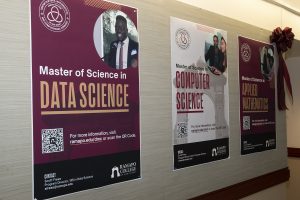
Ramapo College of New Jersey’s Master of Science in Data Science (MSDS) program has been determined by Fortune to be among the top programs in the country. Ramapo’s program is also the only New Jersey program to be included in Fortune’s first-ever ranking list of 28 graduate-level data science programs nationwide.
Categories: Data Science, MSDS
July 2, 2022DMC Advisory Board Member - Keith Osani

Ramapo College’s Center for Data, Mathematical, and Computational Sciences welcomes Keith Osani to our Advisory Board! Our Advisory Board’s mission is to assist the Center in aligning our curriculum with industry needs and expectations, helping us to promote our curriculum, and guide us in developing our sponsored fieldwork experiences to our students.
Keith earned a BS in Computer Science and Applied Physics from SUNY Albany and graduated from Ramapo College in 2022 with a Master’s Degree in Data Science. The
early part of his career was spent working as a consultant where he focused on custom software and web development for a variety of clients. For the last 20 years, Keith has worked in the music industry for Sony Music Group. Over the years with Sony, he has had the opportunity to work in royalties, digital supply chain and most recently data reporting and analytics. He is currently the Vice President of Data and Analytics in the Global Technology group. In this role, Keith leads a data engineering team responsible for the collection and storage of vast amounts of streaming consumption data reported by providers such as Spotify, Apple Music and Amazon. His team is also responsible for supporting Sony’s global community of analysts.
Categories: Data Science, MSCS, MSDS
April 15, 2022Grand Opening of the Center for Data, Mathematical, and Computational Sciences

Wednesday, April 27th at 6pm
ASB 123
Join us in opening the new Center for Data, Mathematical, and Computational Sciences. This research space serves as a place for graduate students and students in 4+1 programs to work in groups, deliver presentations, and hold team meetings. It’s a great place to hold faculty/student meetings and research discussions, and to invite our external partners to campus.
For more information contact Dr. Amanda Beecher (abeecher@ramapo.edu)
Categories: Data Science, MSCS, MSDS
March 22, 2022DMC Advisory Board Member - Yoav Nathaniel

Ramapo College’s Center for Data, Mathematical, and Computational Sciences welcomes Yoav Nathaniel to our Advisory Board! Our Advisory Board’s mission is to assist the Center in aligning our curriculum with industry needs and expectations, helping us to promote our curriculum, and guide us in developing our sponsored fieldwork experiences to our students.
Yoav Nathaniel was born in Israel and grew up in New Jersey, where he attended Ramapo College to study computer science. In 2015, while in school, Yoav joined Avanan, a cloud security startup that was later acquired by CheckPoint, as it’s first employee. Initially focused on QA for Avanan’s product, but later shifted to development, sales, marketing and cloud security thought leadership. Yoav later joined Goldman Sachs and led its firm wide cloud security engineering team, governing the cloud security standards of over 10,000 engineers. In early 2022, Yoav co-founded Silk Security to help security teams accelerate their remediation processes and save hours of work per week.
Categories: Data Science, MSCS, MSDS
February 15, 2022Multifractal Analysis of Daily US COVID-19 Cases
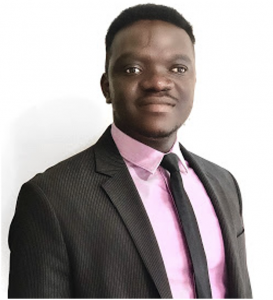
Wednesday, March 23rd at 6-7pm in ASB 323
In this talk we discuss how the multifractal detrended fluctuation analysis (MFDFA) technique can be used to explore the highly irregular behavior or volatility clustering of daily COVID-19 cases in the United States. By using the multifractal spectrum of the MFDFA we will characterize the path and predict the short or long memory behavior of the US COVID-19 Cases on different time scales.
Biography: Osei Tweneboah is Assistant Professor of Data Science at Ramapo College of New Jersey. His main research is Stochastic Analysis, Machine Learning and Scientific Computing with applications to Big Data and Complex Data sets arising in Finance, Public Health, Geophysics, and others. Dr. Tweneboah is co-author of the textbook Data Science in Theory and Practice: Techniques for Big Data Analytics and Complex Data Sets recently published by Wiley.
Categories: Data Science, Lecture Series, MSDS
November 16, 2021Data is the new OIL - Slides and Thank you
Thank Arnab Mukhopadhyay for his insightful overview of how corporations view data, and how that view has evolved. In case you missed it, take a Data is the new OIL from the presentation.
Categories: Data Science, MSDS
August 27, 2021Using Machine Learning to Analyze and Predict the Movement of Horseshoe Crabs in Long Island Sound
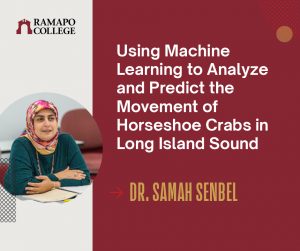
Dr. Samah Senbel, Assistant Professor of Computer Science at Sacred Heart University will be describing her work on developing machine learning models to predict animal movement patterns. Please join us (virtually) on Monday, September 27th at 1pm to learn more about this important area of study in ecology, conservation and wildlife management.
Connection details will be provided after registration.
Abstract: Developing models to predict animal movement patterns is an important area of study in ecology, conservation and wildlife management. Models can be used to decipher patterns in mark-recapture data and machine learning can help to make predictions about future animal movement patterns. Project Limulus (PL), a community research program, has been tracking the movement of tagged individuals in the population of American horseshoe crabs (Limulus polyphemus) in Long Island Sound since 1997. During the spring spawning season, horseshoe crabs are captured by hand in spawning areas along the Connecticut (CT) shoreline, tagged and then released. Recaptured horseshoe crabs give valuable information about their behavior, if they exhibit site fidelity and movement patterns around the Sound. In this paper, we tested various models to find the best predictor for the movement of spawning horseshoe crabs to shorelines in the Sound based on the observed movement activity in previous years. The dataset consists of all the previous horseshoe crab movements: initial longitude and latitude, sex, initial date, and recapture longitude and latitude and recapture date. This dataset has 19,219 recapture records covering twenty years of activity. We experimented with three different models: Linear Regression, Decision Tree, and Random Forest Regression models. We used the data for 2018 as our test set and the data of all previous years as our training set. The Random Forest Regression model proved to be the best predictive model for animal movement and resulted in the smallest RMSE and MAE, as well as the smallest maximum error in prediction. The predicted horseshoe crab locations can be targeted in the next season for recapturing previously tagged horseshoe crabs, which provides valuable information about their movement patterns. It also concentrates the scientists’ effort and time to find the maximum number of horseshoe crabs.
This talk is supported by a grant from the Ramapo College Foundation.
Categories: Data Science, Lecture Series, MSDS
April 21, 2021MSDS Students at Scholars Week - College Football Recruiting Using Machine Learning Techniques
Colette Barca, Keith Osani, Nisha Srishan, and William “Brady” Wulster are inaugural members of the Master’s in Data Science program. During their MATH 570 Applied Statistics course with Professor Osei Tweneboah, they designed and completed a research project to predict high school football recruits’ college commitments using several Machine Learning techniques.
The four designed their project with the understanding that college football is big business. To create a winning team that will continue to generate revenue, Division I Football Bowl Subdivision (FBS) Power Five schools need to choose their recruits wisely. Recruits are selected
based on certain player attributes. Power Five schools are the most frequented schools by NFL scouts, making these schools highly desired by recruits. In this regard, Barca, Osani, Srishan, and Wulster built a model to predict whether a high school recruit will commit to a school in one of the Power Five Conferences. Such a model could allow a school to optimize its recruiting process, maximizing its return on investment. They used their dataset to fit several Machine Learning models. After completing the project, it was determined the Random Forest model produced the most accurate results. This model also revealed which particular attributes are indisputably the most important predictors of commitment to a Power Five school. This final model has the potential to be successfully used to improve the recruiting process.
Categories: Data Science, MSDS
April 25, 2020MSDS Fall course delivery options related to COVID-19
With uncertainty surrounding the upcoming Fall semester due to the COVID-19 pandemic, we want you to know our contingency plans in case of disruption.
All MSDS courses for the Fall 2020 semester are scheduled to be delivered as hybrid courses. This means a large portion of course content will be delivered online, however the course will meet once a week on campus. We’ve scheduled all three MSDS courses to meet on Thursday evenings.
There are two scenarios that could alter these plans:
- Ramapo College converts the Fall 2020 semester to online-only / remote delivery. In the unlikely event this happens, our hybrid format is well suited to move to 100% online, and our faculty have ample experience with this format. While we’d prefer to have the on-campus component, we will be well prepared and will still have a successful semester.
- Ramapo College holds on-campus courses as normal, however you, personally, are unable to be on campus. This could be because you are in a high risk category for COVID-19 and prefer not to attend in-person classes. This could also happen if you have difficulty obtaining a student visa to enter the United States due to delays related to the pandemic. In anticipation of these situations, we are committed to allowing students to attend the on-campus meetings virtually, through live stream or recording.
As we move through the summer and details of the Fall become more clear, we will provide additional details about remote delivery options.
Please stay safe, and we very much hope to see you in the Fall!
Categories: Data Science
February 10, 2020Ramapo adds new Mathematics faculty to support Data Science
Ramapo College is excited to welcome Matthew Jobrack to our Mathematics faculty.
Matthew Jobrack holds a B.S. in mathematics from Longwood University with a concentration in secondary education, a M.A. in mathematics from Appalachian State University, and a M.S in Statistics from Washington State University. He is currently a doctoral candidate in mathematics at Washington State University specializing in analytic number theory, with additional research interests in statistical wildlife population models. He has coauthored peer-reviewed publications in both mathematics and math education. He currently lives with his wife, daughter, 2 cats and 1 dog.
Categories: Data Science
January 13, 2020Ramapo welcomes new Data Science faculty member
Ramapo College is excited to welcome new Data Science faculty member Dr. Debbie Yuster. Dr. Yuster holds a B.A. in Mathematics with a concentration in Computer Science from Cornell, and a Ph.D. in Mathematics from Columbia, specializing in the field of Combinatorics.
Dr. Yuster joins us from SUNY Maritime College, where she has been a math professor for over a decade, earning accolades such as the SUNY Chancellor’s Award for Excellence in Teaching. Dr. Yuster served as a Visiting Data Science Scholar at the Wall Street Journal, and has cultivated industry partnerships leading to student research projects. She has authored peer-reviewed journal publications in mathematics, and has given numerous invited lectures. Dr. Yuster is also interested in K-12 STEM outreach, having worked with secondary school math teachers and students for many years. As part of Ramapo’s Data Science program, Dr. Yuster will teach courses in Data Science, Mathematics, and Computer Science.
Categories: Data Science
December 10, 2019Ramapo welcomes first new Data Science faculty member
Ramapo College is excited to welcome our first new Data Science faculty member, Osei Tweneboah. Osei is a Ph.D. Candidate in the Computational Science Program at the University of Texas at El Paso (UTEP) and will be joining Ramapo this coming Fall – where he will be teaching courses in Python and Applied Statistics.
Osei’s research interests include data science and stochastic analysis with applications to big data analytics and complex data sets arising in finance, health care, geophysics etc. Osei has co-authored fourteen (14) peer reviewed papers in the areas of statistics and data science, applied mathematics and computational science. His most recent work involves applying mathematical modeling processes originally applied to financial data to predicting natural phenomenon – such as earthquakes.
Categories: Data Science
November 20, 2019Data Science at ESPN: NBA player performance

Join us on December 5th to hear Brian Macdonald showcase how Data Science identifies the value of box score statistics in estimating NBA players’ contribution to on-court performance. Dr. Macdonald is the Director of Sports Analytics at ESPN, and has a doctorate in Mathematics from Johns Hopkins University.
Please join us in the York Room (Mansion) on December 5th at 4pm to hear about how these approaches can be applied to a variety of sports such as hockey, soccer, football, and eSports.
You’ll also have the opportunity to learn more about Ramapo’s new Data Science programs, launching this coming fall.
Categories: Data Science, Lecture Series
Copyright ©2026 Ramapo College Of New Jersey | Statements And Policies | Accessibility | Contact Webmaster.
